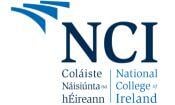
This week marks Dyslexia Awareness Week. Dyslexia is the label given to a learning difference that one in ten people have been diagnosed with. It affects the fluency and accuracy of reading and spelling.
Beyond this though, the less visible difficulties lie with information processing, working memory and the speed of retrieval of information. While dyslexia can bring its difficulties and challenges for students in our education system, it also brings with it great opportunity and a possibility to learn differently. People with dyslexia are creative, out of the box thinkers. What we as educators can do to help is to create an environment where they are allowed to learn and use the skills and strategies they have developed in order to succeed. One example of an NCI student who has used his experience with dyslexia to motivate him to work hard is BSc (Honours) in Computing student, Brian Daly, who shared his story with us to mark Dyslexia Awareness Week.
The majority of lectures at third-level are presented using a verbal approach which does not always accommodate students with dyslexia. Using a visual and kinaesthetic style, demonstrating rather than telling will help all students in the class. Giving the option to students to demonstrate their knowledge in a non-literacy based task will also help. Concept mapping, course outlines, advanced provision of notes and the use of technology, models or virtual learning environments have all been proven to provide students with dyslexia access to their learning. And very importantly, believing in their abilities will also help them to believe in their own potential.
We are constantly blown away by the drive of students with dyslexia. They are some of the most dedicated students you will find. Despite how long it takes them to get through material, despite the different supports they must pull together to produce the work, despite low self-esteem and anxiety, despite having to prove their knowledge in a system that doesn’t allow them to call on their strengths but rather tests them on their weaknesses, they are here. And they are out to succeed. To join the long list of successful people around the world with dyslexia who haven’t let it stand in their way: Albert Einstein, Stephen Spielberg, WB Yates, Mohammad Ali, Richard Branson, Leonardo di Vinci, Bill Gates to name but a few.
So on this week of dyslexia awareness I ask you to do one thing. We are all aware of the challenges it brings but let’s focus on the abilities. For our students and our colleagues with dyslexia how can we allow them to use their strengths in our educational world? Let them show what they can do...
This is a guest post from our Learning and Disability Support Team. Visit our website to learn more about this essential service for NCI students and how to get in touch with the team.
Written by Catherine Elliott, a former member of the NCI Learning and Disability Team.










